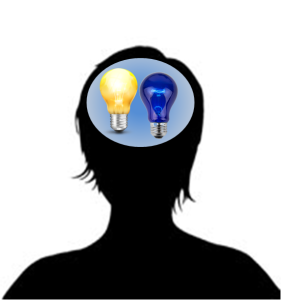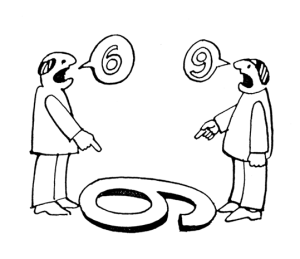An important, traditional, component of civil discourse, emphasized and embodied in the founding of this nation, is the notion that we gain by encountering an opposing opinion.
It seems to me, that lately, this concept is being marginalized or, worse, no longer considered. To some, to seriously consider the others position, is a jeopardy. If some portion of another’s idea is tenable, we somehow lose. It is likely a byproduct of win-lose thinking, in place of flexibility, openness, and negotiation toward progress and advancement. I hope we can reverse this trend.
I believe in “healthy” debate. I was raised in a family where we were allowed to, even encouraged to, respectfully, speak our minds. I do not see the word confrontation as a negative term – though it could be. I was startled to learn my spouse believes confrontation essentially equals condemnation. That equivalency was very foreign to me. I can grasp that concept. I can see how some might arrive at that conclusion, and how some might subscribe to it. But, I do not.
The best treatises on liberty, and society, are emphatic on the subject of freedom of thought – including the equal freedom of others to hold ideas that conflict with our own. That freedom of thought and expression is not only the best way to protect society from tyranny, it is the best path to advancements. The outward expression of that free thinking, in words written or spoken, and the equal accommodation and expression of the counter position, is full civil discourse.
This was how the American Constitution was negotiated and crafted by the founding fathers. It was also declared in the topmost amendment in the Bill of Rights. It does not end there. We need to continue to define and improve this society through vigorous, civil discourse.
 Quoting F. Scott Fitzgerald: “The test of a first-rate intelligence is the ability to hold two opposed ideas in mind at the same time and still retain the ability to function.” I surmise that some people, believe that in doing so, they will fail to function, or lose in some way. I don’t think it takes some special (first-rate) intelligence to hold opposing ideas in our mind. I think we are all capable of the feat. We just need to practice it.
Quoting F. Scott Fitzgerald: “The test of a first-rate intelligence is the ability to hold two opposed ideas in mind at the same time and still retain the ability to function.” I surmise that some people, believe that in doing so, they will fail to function, or lose in some way. I don’t think it takes some special (first-rate) intelligence to hold opposing ideas in our mind. I think we are all capable of the feat. We just need to practice it.
In debate class, students are encouraged, if not driven, to explore both sides of the subject to fully prepare for a forthcoming debate. Some might simply view this as the best path to “winning” the debate. It certainly improves their chances. But more importantly, whether they realize it or not, they gain insights, and invaluable cognitive skills. Such work, such exploration, need not be limited to formal debates or those trained for them. They can be incorporated into our own thinking, evaluation and daily interactions.
Opportunity for gain
An excerpt from an article by Robert P. George about Academic freedom, highlights such opportunities for gain.
 “[John Stuart] Mill points out that when one’s views are challenged there are a couple of possibilities. Our critic might be right, and we might be wrong. If, by presenting reasons and compelling arguments he moves us from error to (or closer to) truth, then we have gained, and should be grateful to the critic who corrected our mistaken beliefs. The other possibility, of course, is that our critic, though a reasonable person, is wrong and we are right. In that case, by listening to his arguments and engaging them in a serious way, we will have deepened our understanding of the truth and appropriated it more fully and securely. Again, we have gained.”
“[John Stuart] Mill points out that when one’s views are challenged there are a couple of possibilities. Our critic might be right, and we might be wrong. If, by presenting reasons and compelling arguments he moves us from error to (or closer to) truth, then we have gained, and should be grateful to the critic who corrected our mistaken beliefs. The other possibility, of course, is that our critic, though a reasonable person, is wrong and we are right. In that case, by listening to his arguments and engaging them in a serious way, we will have deepened our understanding of the truth and appropriated it more fully and securely. Again, we have gained.”
In like fashion, I’ve said, on more than one occasion, that criticism does not diminish me, it informs me.
We can easily extend this to the gray areas, in addition to the near black and white distinctions above. In applying it, we learn, we correct, we adjust, we gain.
All of this potential gain, is missed if we dismiss, or discard, or aggressively silence, contrary positions.
And we also have the civil option to agree-to-disagree and go about our business without hostility.
 I realize that this dichotomous simultaneity of thought might be supremely uncomfortable to people who prefer a more polar approach – win or lose, black or white (not gray), right or wrong. And similarly, it is probably distressing for the many who have been raised, or trained (in this instance, essentially the same thing), to follow rules and not question authority.
I realize that this dichotomous simultaneity of thought might be supremely uncomfortable to people who prefer a more polar approach – win or lose, black or white (not gray), right or wrong. And similarly, it is probably distressing for the many who have been raised, or trained (in this instance, essentially the same thing), to follow rules and not question authority.
 However, I am in the “gray” camp. Staying within my philosophy, I am compelled to allow them their point of view. I emphatically defend their right to have it. I am also well served to occasionally evaluate and re-evaluate both points of view. I will try to engage folks within this framework – even if they will not engage in-kind. We both stand to gain from such exchange – from civil discourse.
However, I am in the “gray” camp. Staying within my philosophy, I am compelled to allow them their point of view. I emphatically defend their right to have it. I am also well served to occasionally evaluate and re-evaluate both points of view. I will try to engage folks within this framework – even if they will not engage in-kind. We both stand to gain from such exchange – from civil discourse.
